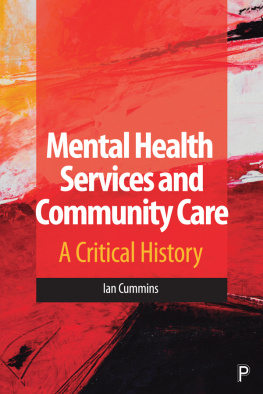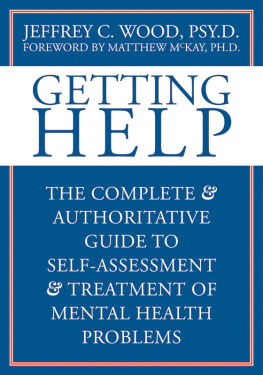SUPERVISION FOR MENTAL HEALTH CARE
The Foundations of Mental Health Practice series offers a fresh approach to the field of mental health by exploring key areas and issues in mental health from social, psychological and biological perspectives. Taking a multidisciplinary approach, the series is aimed at students and practitioners across the people professions, including student nurses, social workers, occupational therapists, psychiatrists, counsellors and psychologists.
Thurstine Basset worked as a community worker and social worker before becoming involved in mental health training and education in the 1980s. He is an independent training and development consultant and has experience in working with a number of universities, statutory and voluntary mental health organisations and service user and carer groups. He has published widely across the mental health training and education field. In collaboration with Theo Stickley, he is a co-editor of Learning about Mental Health Practice (Wiley 2008). He is also a board member for the Journal of Mental Health Training, Education and Practice.
Theo Stickley is associate professor of mental health in nursing at the University of Nottingham. He has authored and edited many books and journal articles about mental health. Each represents his interest in promoting a fair, just and genuinely caring way to think about and deliver mental health care. His area of research is promoting mental health through participatory arts, and he advocates for a creative approach to delivering care.
Available now:
Working with Dual Diagnosis: A Psychosocial Perspective by Darren Hill, William J Penson and Divine Charura
From Psychiatric Patient to Citizen Revisited by Liz Sayce
Models of Mental Health by Gavin Davidson, Jim Campbell, Ciaran Shannon and Ciaran Mulholland
Values and Ethics in Mental Health: An Exploration for Practice by Alastair Morgan, Anne Felton, Bill Fulford, Jaysree Kalathil and Gemma Stacey
Peer Support in Mental Health by Emma Watson and Sara Meddings
Mental Health and Wellbeing by Charles Watters
SUPERVISION FOR MENTAL HEALTH CARE
PAUL CASSEDY AND MAUREEN ANDERSON
Paul Cassedy and Maureen Anderson, under exclusive licence to Springer Nature Limited 2020
All rights reserved. No reproduction, copy or transmission of this publication may be made without written permission.
No portion of this publication may be reproduced, copied or transmitted save with written permission or in accordance with the provisions of the Copyright, Designs and Patents Act 1988, or under the terms of any licence permitting limited copying issued by the Copyright Licensing Agency, Saffron House, 610 Kirby Street, London EC1N 8TS.
Any person who does any unauthorized act in relation to this publication may be liable to criminal prosecution and civil claims for damages.
The authors have asserted their rights to be identified as the authors of this work in accordance with the Copyright, Designs and Patents Act 1988.
First published 2020 by
RED GLOBE PRESS
Red Globe Press in the UK is an imprint of Springer Nature Limited, registered in England, company number 785998, of 4 Crinan Street, London, N1 9XW.
Red Globe Press is a registered trademark in the United States, the United Kingdom, Europe and other countries.
ISBN 9781352007558 paperback
This book is printed on paper suitable for recycling and made from fully managed and sustained forest sources. Logging, pulping and manufacturing processes are expected to conform to the environmental regulations of the country of origin.
A catalogue record for this book is available from the British Library.
A catalog record for this book is available from the Library of Congress.
Contents
List of figures
Dedications
Paul dedicates this book to his father Walter Cyril Cassedy 7/02/1923-27/12/2018. Aged 95 years.
Maureens dedication is For Poppy, and all my other grandchildren who l may never meet, l want you to know where you came from.
We both also would like to dedicate this book to all supervisees and their supervisors who work in Mental Health, in often difficult and trying circumstances, the future of Mental Health is in your hands, so take good care of each other.
Acknowledgements
We gratefully thank all the editorial team. We would like to extend our thanks, appreciation and respect to all our clients, students, trainees and trainers whom we have learned from and taught us over the years, without whom this book could not have been written.
About the authors
Paul Cassedy. R.M.N: R.N.T: Dip Humanistic Psych: Dip Supervision: M.A. Counselling Practice: Registered member of SCPTI and the UKCP.
I have had 15 years working in Mental Health settings followed by 27 years as a Mental Health lecturer. I am currently providing supervision for trainee counsellors and engaged in service work for those in recovery. I aim to continue my learning and development, in now what is the next stage of my life, in mindfulness enquiry and training.
Maureen Anderson. Cert. Counselling Studies: Cert. Couples Counselling: Cert Adult Ed: Dip Supervision: Bsc Psych: M.A Psychotherapy. Registered Member U.K.C.P and Sherwood Institute of Psychotherapy.
I worked in the NHS from 1999 until 2017. My main role was counselling and peer supervision. l have been in private practise since 2014, providing therapy for clients as an Integrative Psychotherapist. I also do couples counselling and provide supervision to trainees and those who are qualified as counsellors and psychotherapists. I am currently studying for a certificate in Existential Psychotherapy.
An Introduction to Supervision
Learning Outcomes
To understand where supervision has emerged from in the helping professions.
To define supervision and distinguish from similar activities.
To understand the benefits of supervision.
To account for the impact of emotional labour on the mental health worker.
Welcome to clinical supervision for mental health practitioners
You are probably reading this book as an introduction to the wide field of what is termed supervision. You have made a good start on your journey. We aim to provide readers with relevant and significant key information on how to get the most out of supervision.
We present this information in as simple and straightforward text, written in a conversational and accessible style a style that we hope is enjoyable and a style whereby you become encouraged, curious and motivated. After all, that is what we hope supervision will provide for you. We want you to think about the value of supervision and the potential benefits for not only your client group but also yourself. We hope the book will clarify and simplify what can be complex and confusing issues, in both the structure and the process of supervision.
This book is for those of you who are embarking on supervision for the first time, who are curious about supervision, who are confused about supervision, who have not had much experience in supervision and who feel their supervision needs refuelling or is becoming stagnated. Therefore, if you are training to become a mental health worker or are qualified as a practitioner and have an investment in supervision, then we hope this book can play an important part in that training.









